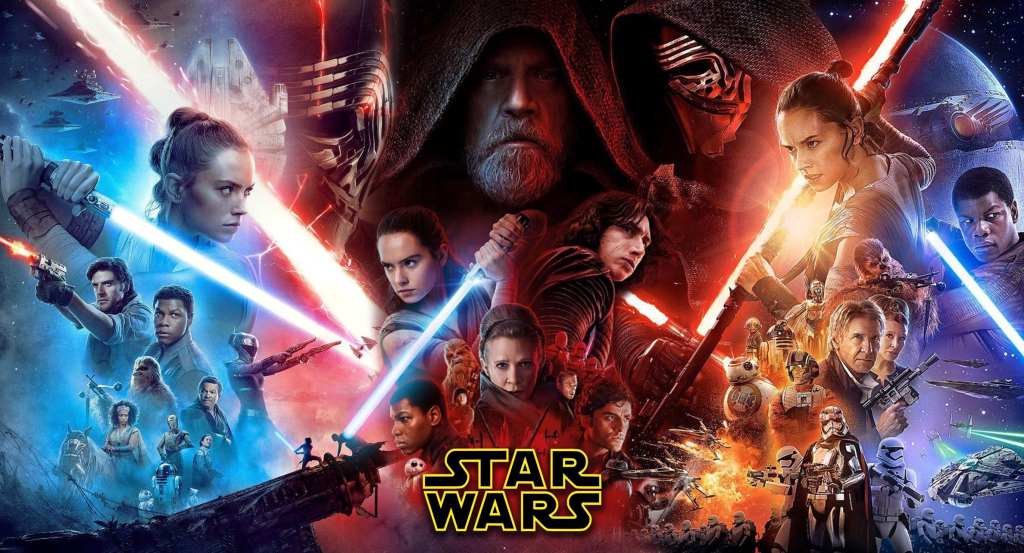
We live in quite a dire time for mainstream blockbusters films. The main reason for that is how rather simplistic and limited most of the choices are for these kinds of big movies that get released nowadays. If it’s not your standard Marvel or DC superhero action flick, then it’s usually another installment in a fairly long-running franchise that usually acts as a reboot, remake, and remix all at the exact same time. There are certain words that people use to describe that exact kind of media. Some call it a “soft reboot”, others now call it a “re-quel” (No thanks to the new Scream movie!), but I think a more proper and not as well-known term for this is literary remix.
When it comes to a remix in the form of literature, it’s stated that it’s best described as an alternative version of a text. A version that for a brief moment that the people are writing it pretend that this version of the text is the real deal. It’s also when William Burroughs used a technique known as cut-up, which was developed by Brion Gysin to remix language in the 1950s. Various textual sources (including his own) would be cut literally into pieces with a pair of scissors, reorganized on a page, and pasted to form new sentences, ideas, stories, and ways of thinking about words. In other words, it’s takes a familiar story but puts a new spin on it’s characters, plots, and themes to make it feel as it’s the first time anyone had ever seen this story told before.
While Star Wars wasn’t or won’t be the first franchise to have used literary remix as well as media literacy for it’s latest trilogy, it’s undoubtedly the one that most other franchises out there will look to for inspiration. We saw it in 2015 before The Force Awakens even came out with Mad Max: Fury Road, Jurassic World, Terminator Genisys (however that’s suppose to be spelt), and Creed and we have continued to see it in the wake of the aftermath of Episode 7 with the likes of Halloween (2018), Terminator: Dark Fate, The Matrix: Resurrections and Scream (2022). Even if Star Wars is no longer the prime standard for big blockbuster filmmaking nowadays in the wake of the Marvel Cinematic Universe and possibly with the Avatar sequels on the rise, it’s reliance of remix in literature and literacy in the form of media has still made it one to copy it’s tentpole from.
As a result, we have the Star Wars sequel trilogy. Three installments that act more as a big tug and pull, more so than the other previous two trilogies. I’m not gonna pretend I have the slightest clue of what went on from behind the scenes and if there was any real “plan” for these series of films but I will judge all three of them on their own terms and how they connect with the other in ways that I think enforce the argument of it’s reliance on literary remix and media literacy.
The Force Awakens- I Have A Very Familiar Feeling About This
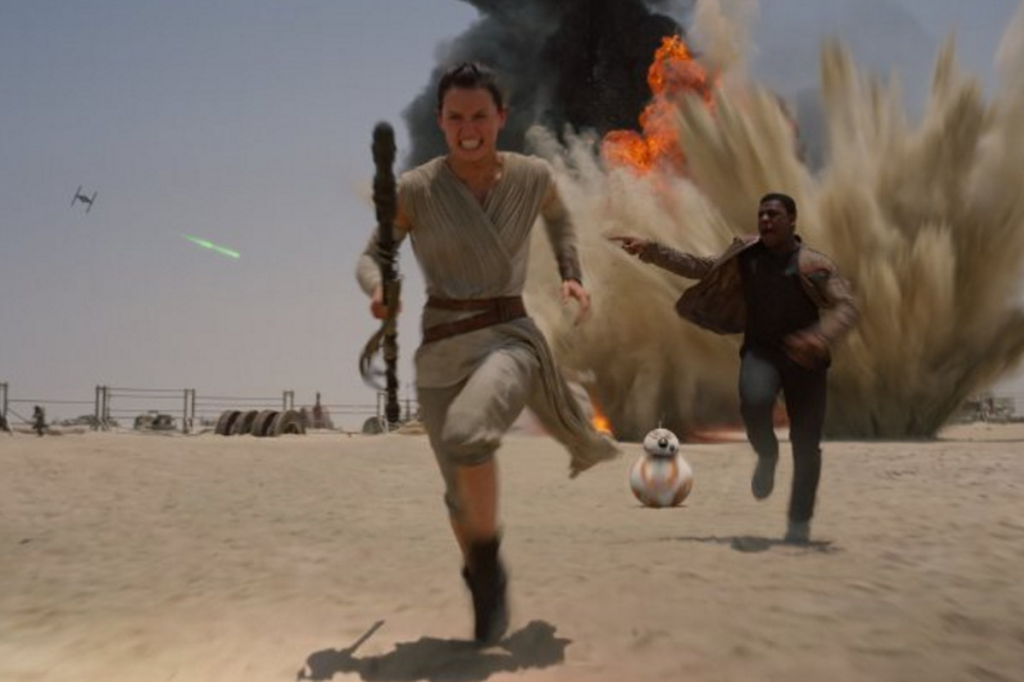
When making A New Hope, George Lucas was clearly inspired by his nostalgia for prime Joseph Campbell. When making The Force Awakens, J.J. Abrams was clearly inspired by his nostalgia for prime George Lucas. It’s like poetry, it rhymes, am I right?!
In all seriousness, I don’t think there is a film in this trilogy that helps redefine the idea of literary remix than with Episode 7. When you looking at from a surface level, The Force Awakens mostly comes across as a more modern and updated retelling of A New Hope in terms of plot, characters, themes, and the overall beats it hits. When looking deep inside the surface, this is where the literary remix comes to play. While it does indeed borrows many of those kinds of plot, characters, and themes that the original Star Wars provided, The Force Awakens uses those major beats and put them in reverse.
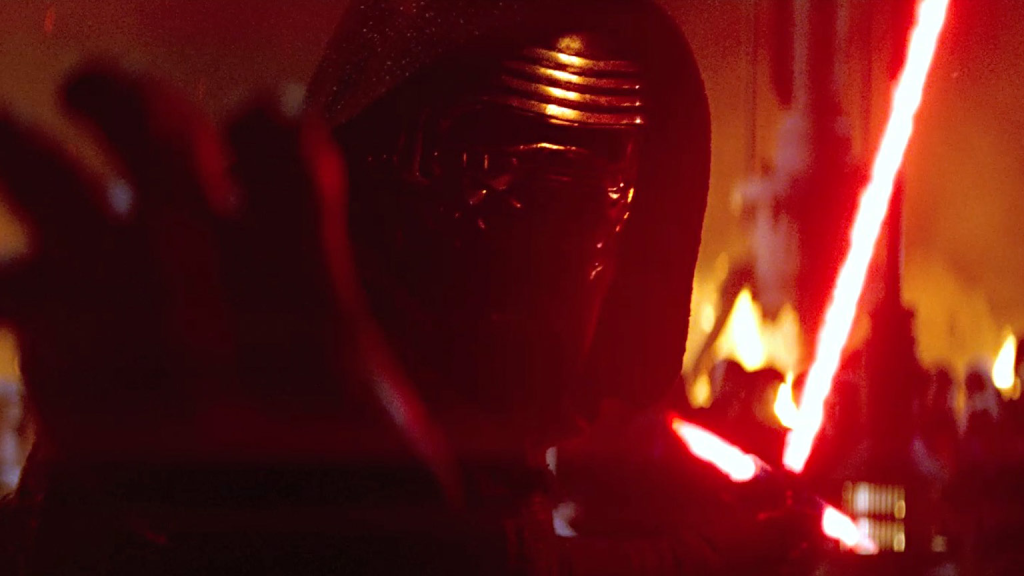
The biggest examples of this is some of the arcs and journeys that the main characters go through majorly reflects the one from A New Hope but has a different spin on it. It’s not a princess this time that is trying to keep the main McGuffin away from the bad guys, it’s a hot-shot pilot. The main protagonist doesn’t want to move on from the desert planet they are currently stranded on, instead the main protagonist wants to stay there in the hopes that her unknown family might return one day. It’s not the older, wisest character of the bunch that is the mentor figure in this story, it’s older, wisest character that acts as a tour figure and guide to have these newer characters feel welcome in the Star Wars universe. It’s not the big battle to destroy the plant-killing system that is the actual point of the climax, it’s the big lightsaber fight between the three main leads that matters the most. It’s examples like these that reflect the overall character themes that the Episode 7 undeniably borrows from Episode 4 but feels pursued to flip the script on them by telling a very similar story in a way that the original Star Wars did not. Rey is not Luke Skywalker, Finn and Poe Dameron are not Han Solo, Kylo Ren is not Darth Vader, and Snoke is DEFINITELY not The Emperor. The arcs of those characters might be similar to the original trio of characters on paper but the internal conflicts that they go through cannot be more different.
Rey is a nobody who discovers she has access to a big power and wants to use in the hopes of finding a family that she never had. Finn is someone that deep down wants to make a difference but is searching for the reason and purpose to do so. Poe Dameron is basically a cocky dudebro who likes to show to everyone why he’s the best star pilot in the galaxy. Kylo Ren wants to be able to unlock that unlimited power that would make his long lost grandfather, Darth Vader proud. This is all vastly different than to the internal conflicts that Luke, Han, Leia, and Chewie go through in the original, especially within the context of this movie. Leia is struggling to keep the Rebel Alliance a float post Return of the Jedi, Luke had fallen into the same trappings that his Jedi mentors before him suffered from, and Han basically acts as the driving force between the old and new elements of the picture while acknowledging how his journey during the original trilogy and after has affected him mentally and emotionally. It’s the character dynamics and the way each character old or new is portrayed that makes The Force Awakens a standard definition of literary remix.
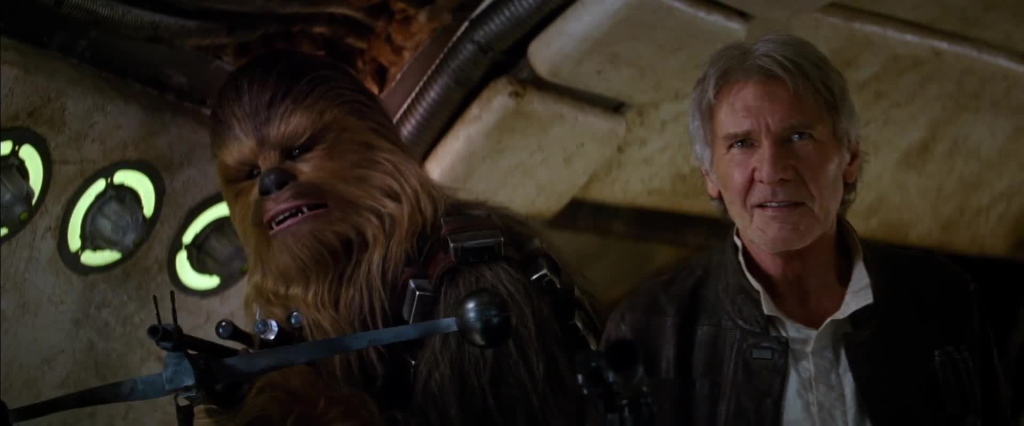
There is no denying that The Force Awakens borrows many of it’s elements from A New Hope but it also can’t be deny the way that this help send an example of the remix culture that we are in now. The key trick is that is uses the idea of modern myths and inspirations that help make the original Star Wars happen by using the franchise’s own myths and inspirations that J.J. Abrams was clearly inspired by to make this form of literary remix even remotely possible. This movie may follow the rules of Star Wars to a T but it certainly does have it’s own ways to do so.
The Last Jedi- Breaking The Unwritten Rules
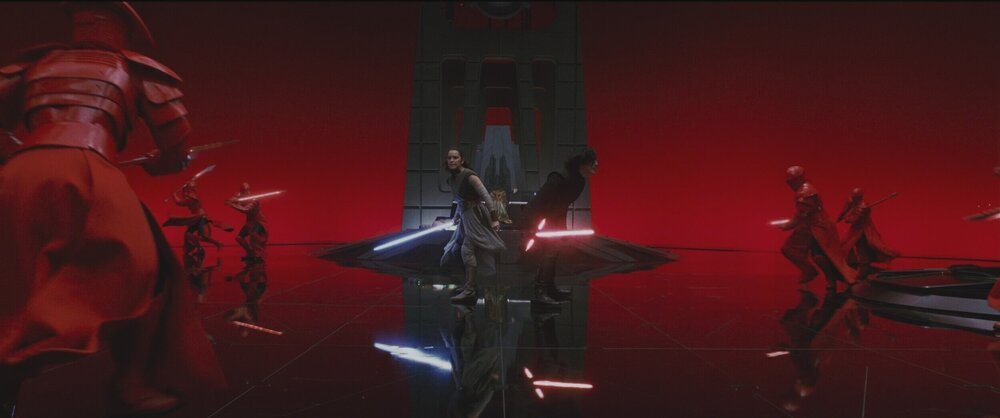
While this next one dives into literary remix as well, it’s more reliant on media literacy than any others. Similar to how George Lucas, Lawrence Kasdan, and Irvin Kershnner use the structure for The Empire Strikes Back as a means of breaking the rules of how movies are suppose to be made, Rian Johnson uses the structure for The Last Jedi as a means of breaking the unwritten rules of a way a Star Wars movie is suppose to be made. Despite how undeniably similar The Last Jedi is to Empire Strikes Back and (to some extent) Return Of The Jedi in terms of plot beats and structure, it still does attempt something that no other filmmaker has tried before with Star Wars, questioning it’s own existence. To plenty of folks out there, that is not suppose to be the case as what the film’s story turns would demonstrate.
Luke Skywalker isn’t suppose to be bitter, broken, and going as far as to say the Jedi must end, he’s suppose to be optimistic, whole, and inspire the next generation of Jedi regardless of what has happened in between trilogies, just like how he was at the end of Return of the Jedi. Snoke isn’t suppose to die before revealing any of his so-call backstory, he’s suppose to be the evil mastermind that explains his whole backstory and plan to everybody and be the main villain throughout the whole trilogy, just like the Emperor. Admiral Ackbar isn’t suppose to die unexpectedly and be replaced in command by a purple haired woman who makes the logic breaking but badass sacrifice herself, he’s suppose to say his iconic catchphrase and go out like a true hero, just like in Return of the Jedi (at least the first part anyway). Finn and Rose aren’t suppose to fail their side mission, they’re supposed to succeed it or that sequence might come across as a big waste of time despite it being necessary for the final shot of the film. Leia isn’t suppose to use the force to save herself in space, she’s suppose to use the force in a way that her brother only can, like in Empire Strikes Back. Yoda isn’t suppose to back up Luke in claiming that the Jedi must be extinct, he’s suppose to be an ally to the Jedi as long as he is one with the force, just like how he was in both the prequel and original trilogy. Rey isn’t suppose to be revealed as a nobody, she’s suppose to be related to a Skywalker or Kenobi because of how powerful with the force that she is, just like with Luke Skywalker in the originals. Lastly, Luke isn’t suppose to die at all, he’s suppose to live on for all eternity just because…..he can?! All of things aren’t suppose to happen yet they did.
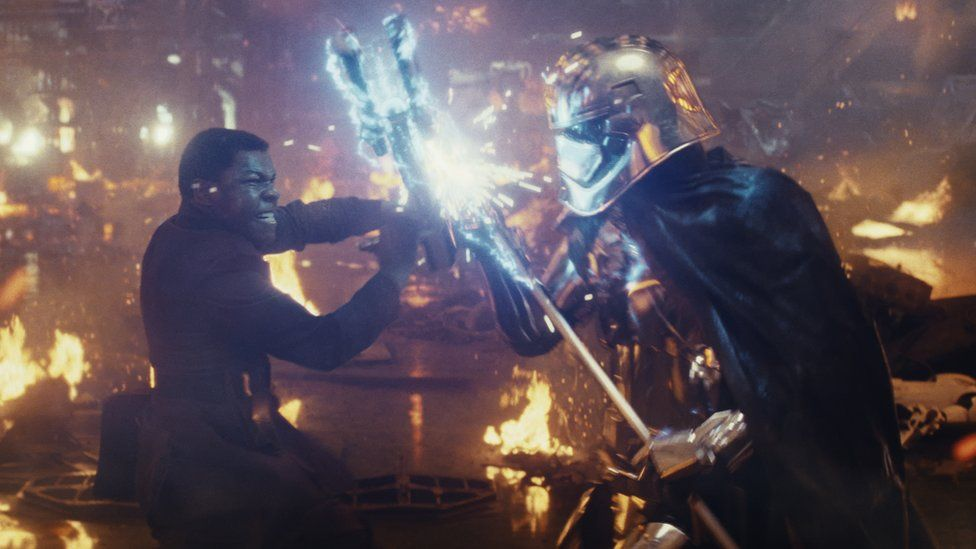
That makes the media literacy stand out the most in The Last Jedi as oppose to the other two movies in this trilogy. It’s unafraid to access, analyze, and evaluate itself in the hopes that this could lead to a great, many things. If it has to harshly condemn it’s characters for constantly making mistakes from the past in the hopes that they may evolve passed it in the future, then so be it. It doesn’t become any more obvious then the way they follow through on the character and plot lines in the way that you are not suppose to in a Star Wars movie. Whether you’re suppose to or not, it is the way it is.
Luke Skywalker is broken shadow of his former self that was consumed by his own sins and failures of the past who forgot why he came a Jedi in the first place. Snoke is nothing more than a stepping stool to Kylo Ren’s progression towards the dark side and make him the most powerful version of his grandfather than ever. Ackbar is just some random character who is iconic for his design and line that has been memed to death and nothing more. Holdo is just a more important character and helps Poe’s arc about not being a hot head all the time and learn to obey your superiors knowing that moment will always come to you at the right moment. Leia can use the force to save herself from space because she just now can. Finn and Rose go on that Canto Bight quest as a means of seeing Rose’s point of view with being on the Resistance along with setting up the final sequence of the film with the kid looking off to the bright moon. Yoda agrees with Luke that the Jedi must end and something else within the force must begin. Rey is a nobody who must now forge her own path to find her place within the Star Wars canon. Lastly, Luke is now at long last with the force and is in complete inner peace while discovering the true purpose to being a Jedi, that the Jedi use the force for knowledge and defense, NEVER for attack! All of those things are true and the film can’t help but think it’s much better because of it.
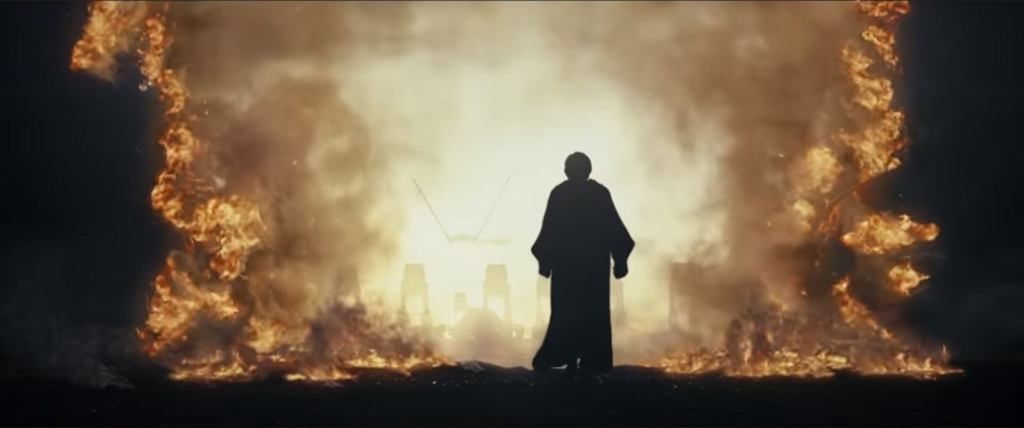
Whether you like it or not, The Last Jedi is the first Star Wars to openly question the franchise’s existent and asks questions on it’s mind that it believes need to be asked if Star Wars is to have any sort of future beyond the Skywalker Saga. Heck, it even lies well with what I mention about how the Jedi were portrayed in the prequel trilogy and Clone Wars era, they just can’t help but suck.
And Luke has the point here. Regardless of how much success the Jedi might have had in their history, there will always be something that holds them back and make them destined for failure. From the downfall of Yoda’s student in Count Dooku to Obi-Wan Kenobi’s student in Anakin Skywalker and Luke Skywalker’s student in Ben Solo, it’s an endless cycle that will always make the Jedi set up for failure. The only way to escape this countless cycle is to break it and rebuild it to a cycle that works. It might not be the Jedi way but it is definitely the way.
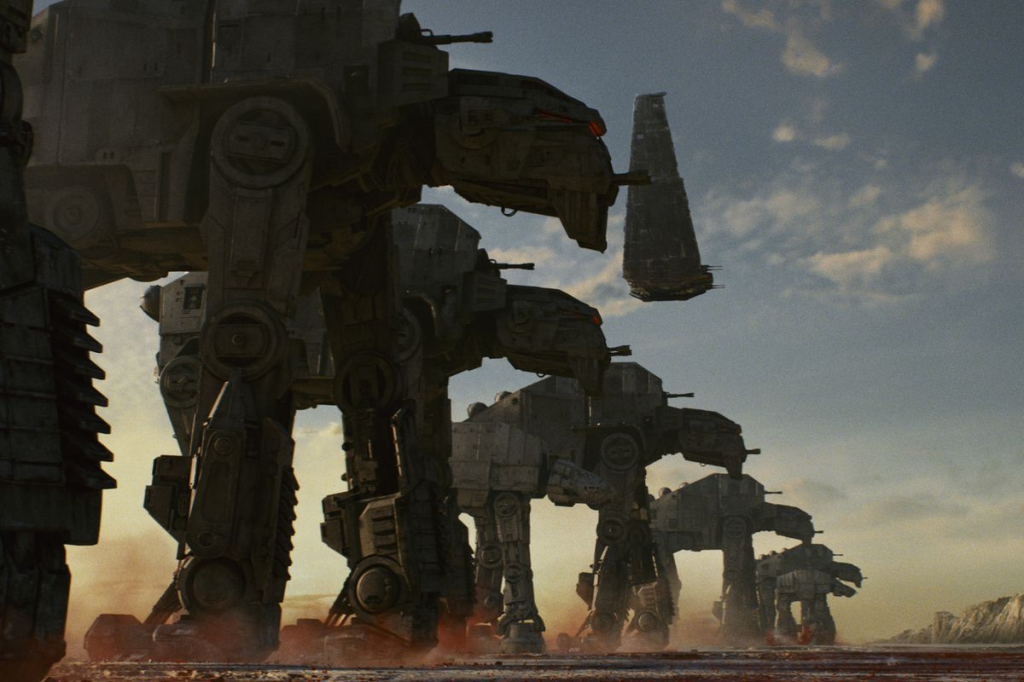
The Last Jedi in a lot of ways can be seen as the anti-Star Wars movie but it does feel like one that stands out as being the one movie in this trilogy that George Lucas in his prime would have made. One that feels the need to break traditions to make room for newer and better ones. One that isn’t afraid to test it’s audiences with what they want and expect out of Star Wars. And one that isn’t afraid to break rules if it makes the overall film worthwhile. However, how worthwhile the middle chapter in this supposed trilogy will be will depend on how the third and final installment follows it up.
Duel Of The Fates/The Rise Of Skywalker- Jekyll and Hyde
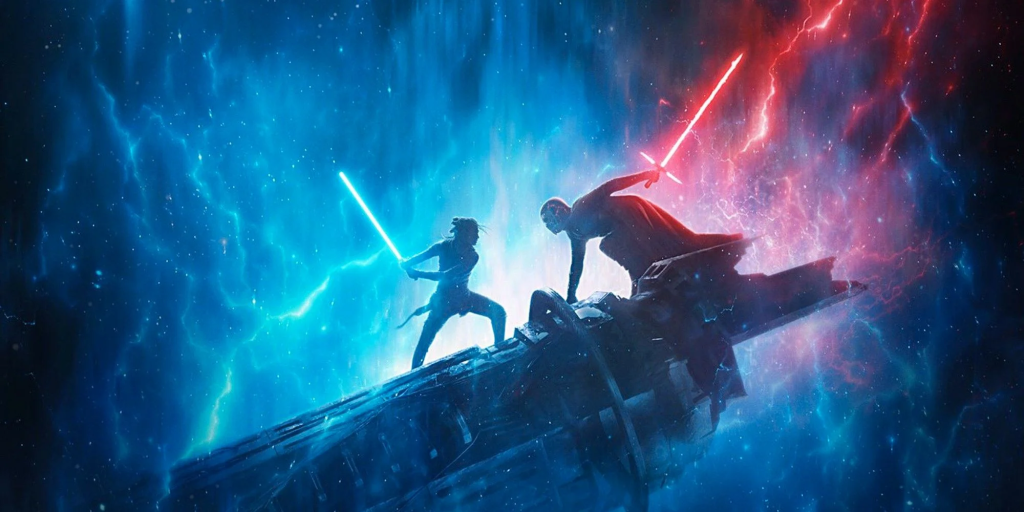
Okay, so this one might be weird since I’m not just covering The Rise of Skywalker but also Duel of the Fates, a suppose first draft leaked that was previously written by initial Episode 9 director Colin Treverrow and his co-writer Derek Connolly. The reason for it is because both of these movies provided completely different follow-ups to The Last Jedi. One acts as a counter point, the other acts as a counter argument. That’s why I feel it’s best to examine both of these to this Jekyll and Hyde-style final entry in the sequel trilogy.
Duel of The Fates- Counter Point
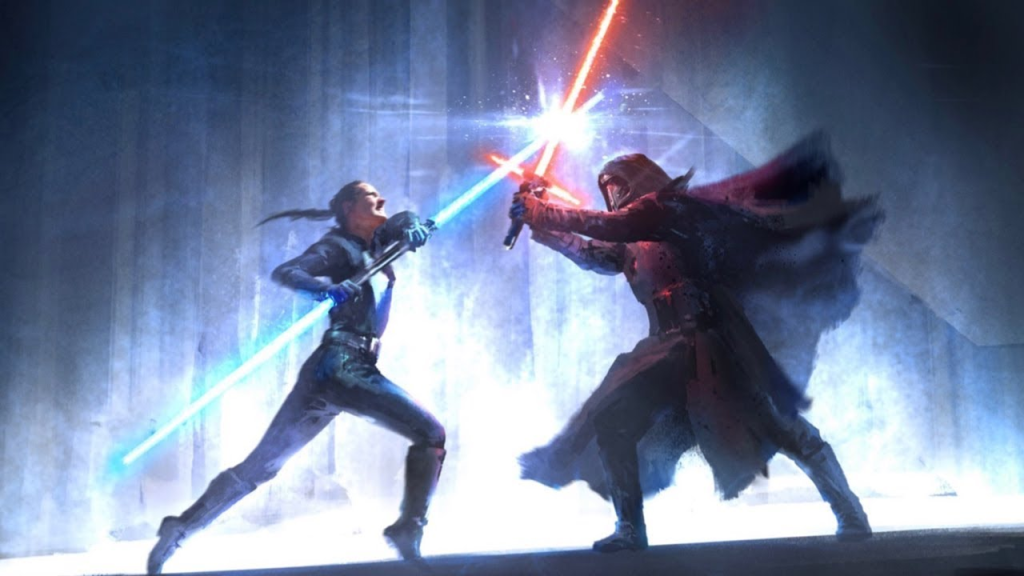
In case you didn’t know, Duel of the Fates was the original title for Episode 9 that the previously hired director Colin Treverrow had in mind before he was let go of the project due to creative differences with Kathleen Kennedy and Lucasfilm. However, shortly after The Rise of Skywalker came out, there was a link that confirmed the original first script for Episode 9 that was submitted in 2016, about a week before Carrie Fisher unexpectedly passed away. I won’t pretend to know why exactly Treverrow was fired and what exactly in his script that turned the folks at Lucasfilm the wrong way but for what this leaked script shows, it does acts as a logical expansion to the lessons and themes of The Last Jedi regarding the need for the force to have a new light and using that spark of hope that Luke gave the rebellion at the battle of Crait and passed that on to the whole galaxy.
In this Duel of the Fates script, we see the character’s taking the most logical step forward possible with their arcs along with giving them a definite conclusion to their stories that feel fresh and unique in it’s own right. By the end, Rey is able to proper find the right balance between the light side and the dark along with discovering her true purpose in her life, Finn is able to become that inspiring leader to other turned stormtroopers and folks who desperately need a reason to hope again, Poe is able to honor the legacy of his previous General Leia and Admiral Holdo by become the responsible leader they would have wanted him to, and Kylo Ren ends up dying along with Ben Solo being the last Skywalker to suffer a tragic, inevitable fate. It’s able to hit the beats that I imagine someone who agreed with what The Last Jedi was saying would follow it up by.
This is a script that is able to expand the forces in ways that no other film in the series had before, explore that “gray” area of the force that makes the entire Skywalker saga feel like it’s come full circle, show how inspiration and having each other’s back can help anyone conquer evil, show off action sequences that would make for a rather mindblowing experiences in the theaters, and is able to bring a ending that feels definite, proper, and is able to justify the existence of it’s own established trilogy. Oh, and it also ends in the way that George Lucas initially had in mind for the ending of the original trilogy, having C-3P0 and R2-D2 recapping the events of all Star Wars films to a bunch of total strangers.
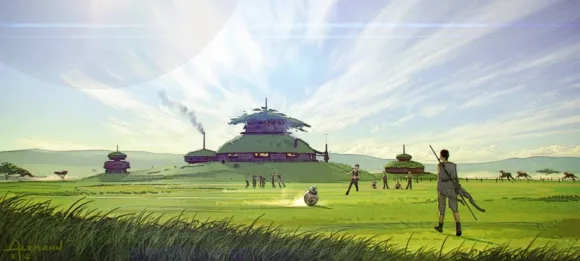
There might be some questionable plot elements in there (like a Rey and Poe romance, the Emperor’s master still around, and Kylo being the killer of Rey’s parents) but no doubt, it is able to follow through on the plot points established from the previous two films and make a ending that feels like it’s own thing in spite of similarities. Which makes it seems odd that this ended up being the Episode 9 we never actually got.
The Rise of Skywalker- Counter Argument
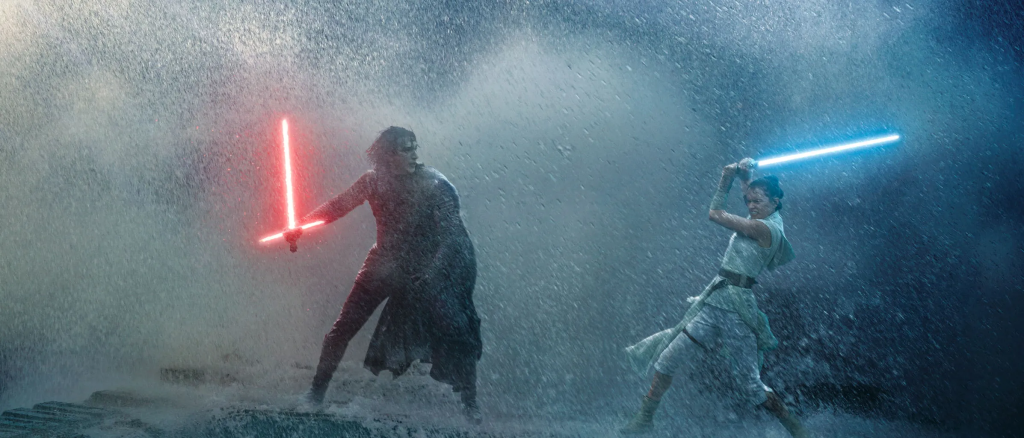
While no doubt many can describe The Rise of Skywalker as being a retcon to The Last Jedi, I view as more of a counter argument of it. There are definitely many plot points from the previous film that certainly doesn’t come across as a progression of that story but more of The Force Awakens. While The Last Jedi seems to argue that Star Wars needs to move beyond it’s own standards and traditions, The Rise of Skywalker seems to argue that Star Wars should not move past it and remain what it is since that has what made the franchise last for as long as it has. Where The Last Jedi used media literacy and (to some extent) literary remix about the Star Wars franchise up to this point, The Rise of Skywalker can’t help but use both of these elements about the movie that came before this one. This is shown through how the movie follows up the plot threads of the previous movie and how it can’t help but feel familiar to previous Star Wars movies because the movie thinks it just isn’t Star Wars if it didn’t do exactly that.
Rey shouldn’t be a nobody who must forge her own path with the force but be related to one of the force-using characters from the previous films because Star Wars always has ties to lore and family heritage. Finn shouldn’t be a standard stormtrooper who should set an inspiration to others but be a suppose force-user because the force has to be expanded upon in some way shape or form. Poe shouldn’t be his own cocky character with a mysterious backstory but should be that along with a backstory that represents the kind of smuggler that Han Solo was. Kylo Ren shouldn’t be the main villain in the final installment but be a stepping stool to The Emperor’s return to take his revenge on the galaxy and that the final movie needs a big bad guy to increase the stakes. The Rise of Skywalker seems very hellbent on sticking to the own traditions and tropes that Star Wars is most well known for because it thinks it wouldn’t be Star Wars without it.
Does that make Star Wars perfect? Nope, but it definitely makes Star Wars the way that Star Wars always has been. It’s familiar and imperfect because it’s Star Wars. That’s not to say that Rise of Skywalker changes everything from Last Jedi, it does play a bit with that force bonding trick that movie introduced to create a pretty creative lightsaber fight between Rey and Kylo and even paying off Luke sacrifice’s in the battle of Crait by Lando bringing everyone and their mother from the galaxy into the final battle. However, when viewing it in hindsight, you can’t help but feel that The Rise of Skywalker is definitely at movie that is at war with itself. This can mostly be because that J.J. was involved with the first film in the trilogy and someone entirely different was involved in the second one, but the movie still can’t help but feel like a two-and-a-half long response to the Last Jedi and less of a continuation of it that Duel of the Fates was looking to be.
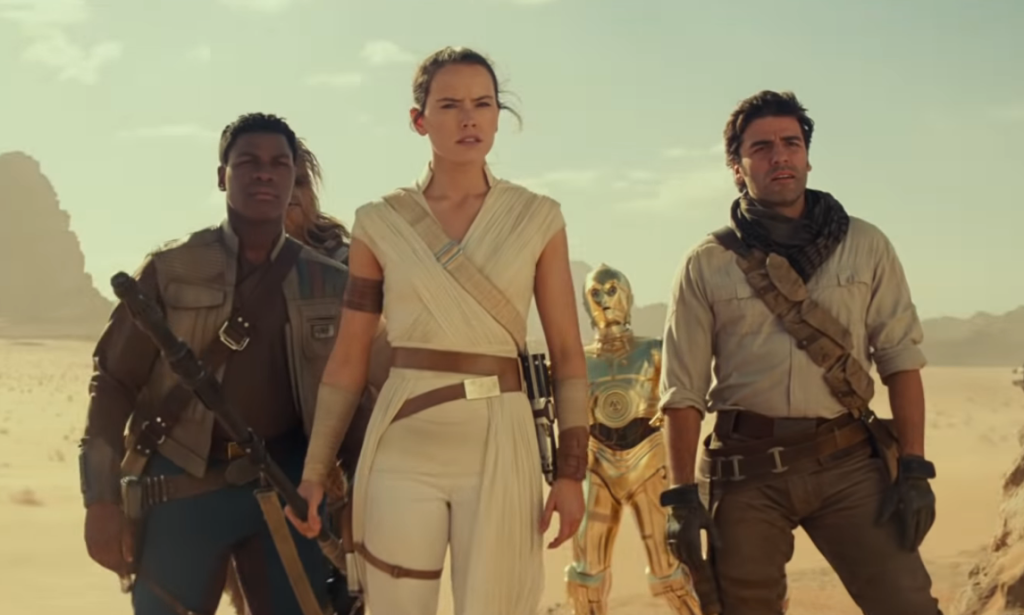
It’s hard to say exactly how Episode 9 would have fared if Treverrow was never fired and Carrie Fisher was still around but it is quite fascinating that we have at least two different versions of what can be described as the final film of the sequel trilogy along with the Skywalker sage and how each one seems to react differently to the previous two films. Whether it’s for the better or not, no doubt if it makes this comes across a Jekyll and Hide-style psychological war in itself that it can’t help but feel like two different endings of a trilogy does in fact exist.
In Conclusion:
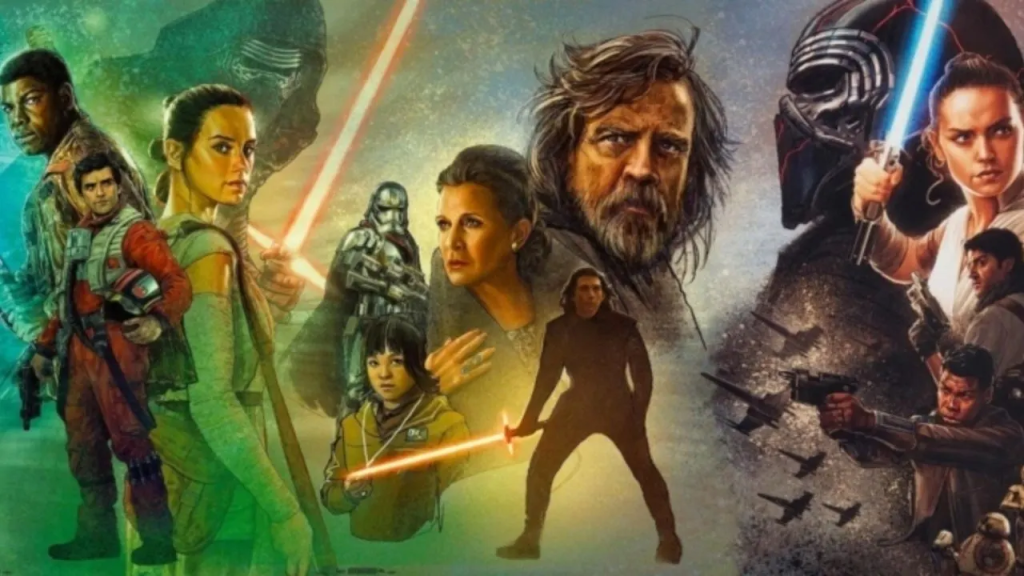
Regardless of what your opinions are on the prequel trilogy and how well it was executed, you can’t deny that George Lucas was trying to provide a COMPLETELY different experience than with the original trilogy. The sequel trilogy, with it’s reliance on literacy remix and media literacy, doesn’t try to be all that different but rather be as familiar with the original trilogy as possible.
Some might view that as a big con but it can actually be described as a big pro. Sometimes re-introducing a generation to a new era of Star Wars by following the similar beats that introduce previous generations to Star Wars can be seen as a necessary evil. Sometimes a series doesn’t need a visionary or something with a so-called “plan” to make it worthwhile, sometimes it’s exciting to just start from scratch and find out for yourself along with the audience the path you will find yourself taking to reach your endgame. Sometimes it’s interesting to see familiar beats be done in new and twisty ways. Sometimes it’s okay to admit that something that many would describe as perfect is actually imperfect. Sometimes it’s okay to admit that Star Wars, warts and all, is just simply Star Wars.
It’s hard to say how others will view the sequel trilogy in hindsight and if future film classes will look into the film’s subtext and meta commentary in the way that I just did. However, there are definitely lessons, both good and bad, to be learned with these three movies and these are lessons that hopefully future Star Wars installments or even other franchise installments will take to heart. The future of the aftermath of this trilogy is unknown but as a wise old Jedi master once said in a different era of this franchise, “Always in motion is the future and many possible futures there are!”
Next up: Star Wars Spin-Offs/TV Series
I don’t have the proper trailer to include with this so, yeah.